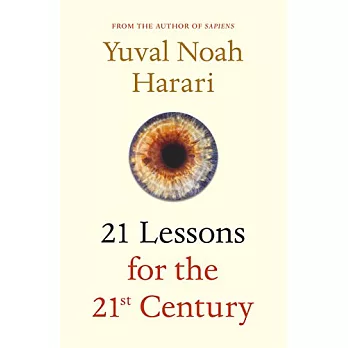全球思想指標哈拉瑞Yuval Noah Harari重磅新作
21堂課──理解‧適應‧生存──獻給21世紀的每個人
《人類大歷史》哈拉瑞帶領讀者回望人類發展至今的歷程,如何從至少六個人種,到今日只剩下我們─智人Homo Sapiens─主宰地球的宏大歷史。來到《人類大命運》,他將我們的眼睛轉向前方,當我們已征服長遠歷史給人類最大的三個挑戰:饑荒、瘟疫、戰爭。他描繪在長遠未來,人類將面對的三大關鍵議題:不停延長的生命、個人主義居於領導地位、科技將使我們從「智人Homo Sapiens」成為「神人Homo Deus」一般的存在,而我們的社會與人類自身,如何應對這些轉變及挑戰。
看見過去,也展望了未來。這次,哈拉瑞邀請讀者注視我們身處的「當下」。世界上正發生哪些重要的事?哪些是當前最迫切的議題與挑戰,而我們應當關心?
全書分為科技挑戰、政治難題、希望與絕望、真相、韌性五大主題,以21篇短章構成,提綱挈領地勾勒出與我們息息相關的課題─
像是:
※工作將如何改變?──隨著AI、機器人技術發展,當我們的孩子長大後,工作還會存在嗎?
※國族主義能解決全球問題?──我們如何理解川普崛起、英國脫歐、普丁極權領政的現象,與這些將帶給世界的影響?
※正義的意義?──對正義的認定與社會、文化的演進深深相關。然而,它有時可能是過時的,當兩方理解相衝突,如何找尋解方?
※教育的目的──世界不停地變動,什麼是我們想留給下一代的工具、知識及價值?
當我們都覺察到今日的世界正處於轉變中—在這個混亂而茫然的世代,過往被奉為圭臬的信條正崩毀,但我們卻仍未找尋到一個新的敘事,為世界描繪經緯,指出方向─讓每一個身在此時的人們理解正面臨的現況,變得更加地重要,因每一個你我與下一代,都將承擔今日的課題在明日造成的結果。
哈拉瑞在導言裡寫到:「不像《人類大歷史》與《人類大命運》,本書並不著重在歷史敘事,而是以一系列課程的方式呈現。這些課堂不以簡易的答案作結,它的目的在於啟發你的思考,幫助讀者加入我們身處的世代裡,最重要的討論。」一如前兩本躍升全球暢銷的作品,本書依舊保有哈拉瑞的寫作特色,行文流暢易讀,提供宏觀的視野,更兼顧個人在其中的處境。《21 Lessons for the 21st Century》無疑是生活於21世紀的你我,一本必讀的全新經典。(文/博客來編譯)
In Sapiens, he explored our past. In Homo Deus, he looked to our future. Now, one of the most innovative thinkers on the planet turns to the present to make sense of today’s most pressing issues.
How do computers and robots change the meaning of being human? How do we deal with the epidemic of fake news? Are nations and religions still relevant? What should we teach our children?
Yuval Noah Harari’s 21 Lessons for the 21st Century is a probing and visionary investigation into today’s most urgent issues as we move into the uncharted territory of the future. As technology advances faster than our understanding of it, hacking becomes a tactic of war, and the world feels more polarized than ever, Harari addresses the challenge of navigating life in the face of constant and disorienting change and raises the important questions we need to ask ourselves in order to survive.
In twenty-one accessible chapters that are both provocative and profound, Harari builds on the ideas explored in his previous books, untangling political, technological, social, and existential issues and offering advice on how to prepare for a very different future from the world we now live in: How can we retain freedom of choice when Big Data is watching us? What will the future workforce look like, and how should we ready ourselves for it? How should we deal with the threat of terrorism? Why is liberal democracy in crisis?
Harari’s unique ability to make sense of where we have come from and where we are going has captured the imaginations of millions of readers. Here he invites us to consider values, meaning, and personal engagement in a world full of noise and uncertainty. When we are deluged with irrelevant information, clarity is power. Presenting complex contemporary challenges clearly and accessibly, 21 Lessons for the 21st Century is essential reading.



 天天爆殺
天天爆殺  今日66折
今日66折 

























 博客來
博客來 博客來
博客來 博客來
博客來 博客來
博客來 博客來
博客來